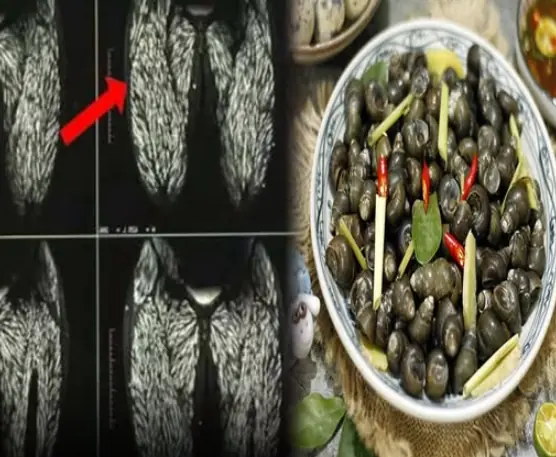
Woman gets meningitis from a food that is in every house's refrigerator

Recently, Mrs. Li, 55 years old, living in Henan Province, China, was urgently hospitalized due to severe headaches. After examination, she was diagnosed with bacterial meningitis caused by Listeria monocytogenes. Doctors noted that prior to her illness, she had eaten frozen meat that was thawed from the refrigerator. Although the meat was cooked thoroughly, it might have been contaminated with bacteria during handling, possibly from unclean hands. Previously, there were cases of pregnant women nearly miscarrying after eating refrigerated vegetable salad, and more recently, an elderly person died after consuming refrigerated rolled cakes. All these incidents are linked to the same “invisible killer” in the fridge — Listeria bacteria.
Dr. Guo Jifeng, Head of Neurology at Xiangya Hospital, Central South University, explained that Listeria monocytogenes is a foodborne pathogen widely found in nature. Contrary to common belief, this bacterium tolerates cold very well and can multiply in refrigerated environments at 0–4°C, even surviving dormantly at -20°C for up to a year. It is commonly found in undercooked meats, dairy products, ready-to-eat salads, and frozen foods, silently spreading through cross-contamination during food handling.
Dr. Guo emphasized that the human blood-brain barrier can block most pathogens, so healthy adults infected with Listeria typically experience mild symptoms such as diarrhea or fever and do not need to panic. However, for pregnant women, newborns, elderly people over 65, and immunocompromised individuals (such as cancer or diabetes patients), Listeria can cross the blood-brain barrier, causing severe complications like sepsis, meningitis, miscarriage, or death. What is more concerning is the incubation period of this bacterium can be as long as three weeks, with initial symptoms resembling the flu and easily overlooked until severe signs such as high fever, neck stiffness, and seizures appear.
To prevent risks from Listeria, it is important to eliminate the misconception that "the refrigerator is an absolutely safe storage place." In reality, freezing cannot preserve food indefinitely, and safe storage times vary for different meats:
-
Seafood such as fish and shrimp: should be consumed within 2–3 months.
-
Red meats such as pork, beef, lamb: can be stored for 6–12 months.
-
Poultry (chicken, duck, etc.): should be used within 6 months.
-
Processed meats: should not be kept longer than 2 months. Even fresh meat stored in the refrigerator’s cool compartment is best consumed within 2 days.
Proper food storage and handling are crucial. Firstly, raw and cooked foods must be kept separate, with raw meat placed on the bottom shelves to avoid drippings contaminating other foods. Before freezing, meat should be portioned to avoid repeated thawing, which increases contamination risk. When cooking, the internal temperature of food must reach at least 70°C and be maintained for 5 minutes or more to completely kill Listeria bacteria. Additionally, refrigerators should be cleaned regularly, especially areas prone to dirt buildup such as door seals and shelves. Ensure refrigerator doors are tightly closed and avoid frequent or prolonged opening to limit bacterial growth.
For high-risk groups, special caution should be taken to avoid high-risk foods such as raw products, soft cheeses, unpasteurized milk, and pre-cut salads.
News in the same category


Even if you like them, it’s best to avoid

Doctors warn that these 6 oils should be limited, because if consumed in excess, it can increase the risk of colorectal cancer, liver cancer, breast cancer and prostate cancer

Startled: 5 signs on the hand warn that the lungs are in danger

More and more people are dying from heart failure, doctors warn: No matter how difficult it is, you must give up these 4 habits!

Woman Di.es After Using Air Conditioner: Doctors Warn of a Critical Mistake Many People Make

Shoc.king: 5 Alarming Signs in Your Hands That May Indicate Lu.ng Problems

COVID-19 returns, advice for middle-aged and elderly people: Touch 2 things less, eat 3 dishes more, do 4 things well, strengthen immunity

25-year-old man pees "strange green liquid" and falls into a deep coma due to deadly poison commonly found in a popular dish

3 Common Household Items Loaded with Toxins: Many Families Use Them Daily Without Realizing the Danger

What to Do If You Catch the New COVID-19 Variant: Expert Tips for Easing 4 Common Symptoms

I'm a doctor and I threw my air fryer in the BIN - and you should too for ca.n.cer reasons

Study of 900 COVID-19 patients finds: Vitamin helps restore physical strength faster

3 types of meat are "nests of parasites" if cleaned carelessly, many people still rush to eat them without knowing

Suffering from a prolonged choking sensation, thought to be a stomach problem, the woman accidentally discovered that her thyroid gland had CAN.CER

Persistent Throat Tightness Mistaken for Gastric Issues—Woman Discovers Thyroid Can.cer by Accident

4 parts of chicken you should not eat

Drinking coffee at the wrong time can ha.rm your heart

6 wa.rning signs your bo.dy might be “nurturing” can.cer
News Post

Be careful with these foods that contain a lot of para.sites

Secrets for Planting Ginger: How to Grow an Endless Supply at Home

Tips for frying food without sticking to the pan

Even if you like them, it’s best to avoid

Planting Blueberries at Home: A Guide to Cultivating an Abundant Supply

The Egg

Tips to clean a shiny gas stove with just white vinegar

How Christmas Came to the Santa Maria Flats

5 foods that are better off stored outside the fridge

Unexplained Phenomenon: Strange Signals Suspected Aliens Are Trying to Contact Earth?

Dirty Grout Between Bathroom Tiles? These 5 Simple Methods Will Restore the Shine With Minimal Effort

No More Watery or Dry Meat – Use This Drop Method to Defrost Fast and Keep It Fresh

Doctors warn that these 6 oils should be limited, because if consumed in excess, it can increase the risk of colorectal cancer, liver cancer, breast cancer and prostate cancer

A Country Christmas

Startled: 5 signs on the hand warn that the lungs are in danger

More and more people are dying from heart failure, doctors warn: No matter how difficult it is, you must give up these 4 habits!

How to Choose Fresh Fish Like a Pro: Secrets from Coastal Fishermen

Woman Di.es After Using Air Conditioner: Doctors Warn of a Critical Mistake Many People Make

Shoc.king: 5 Alarming Signs in Your Hands That May Indicate Lu.ng Problems
